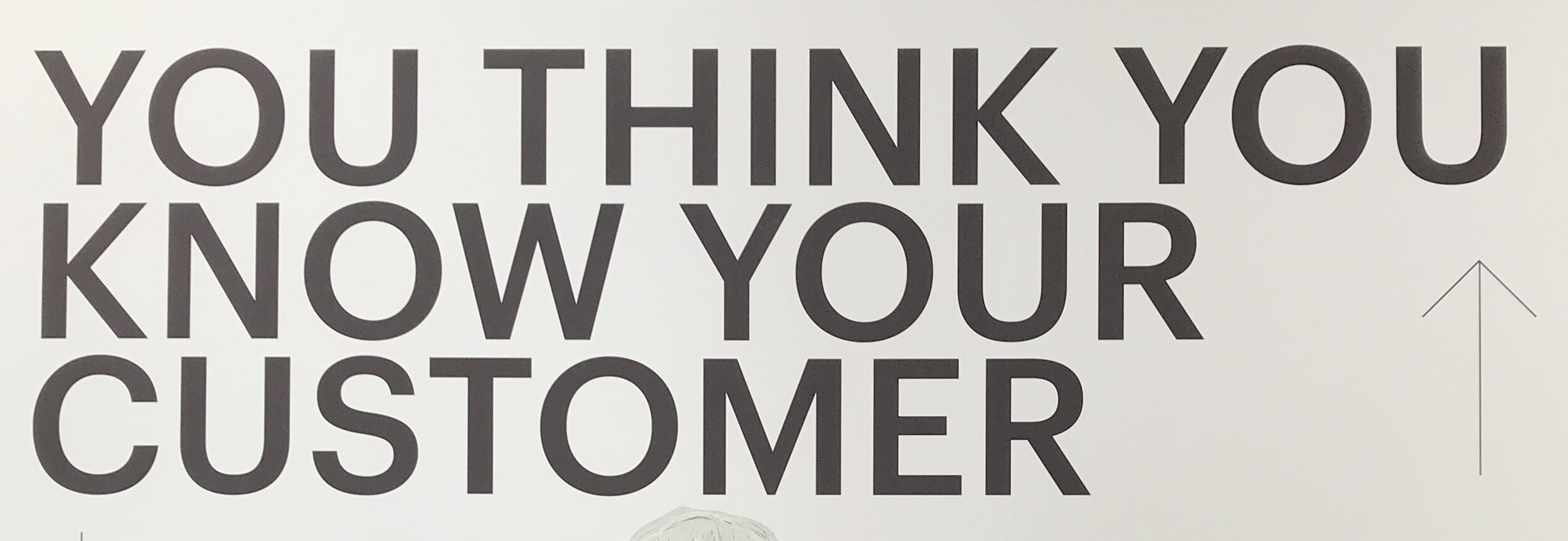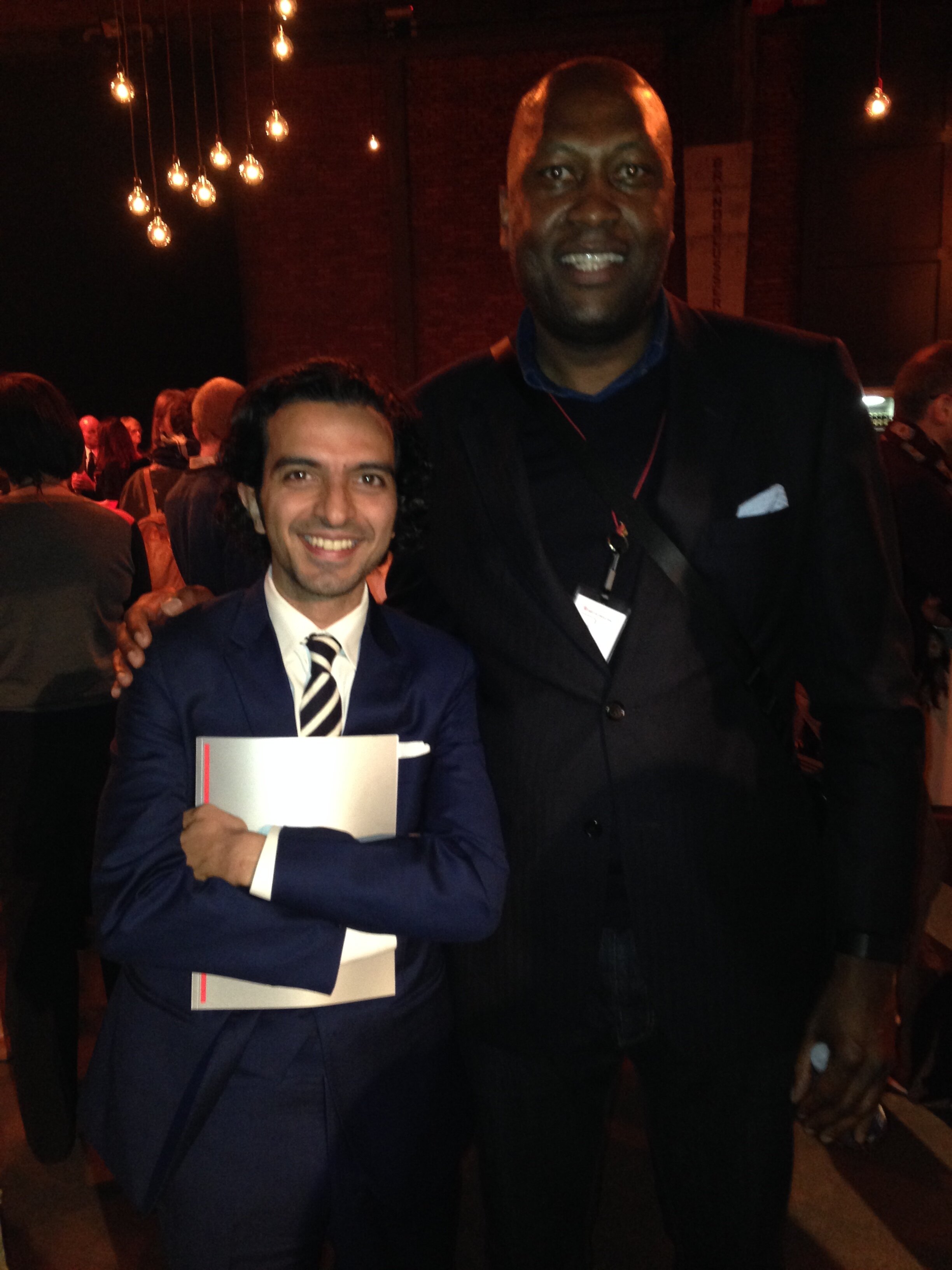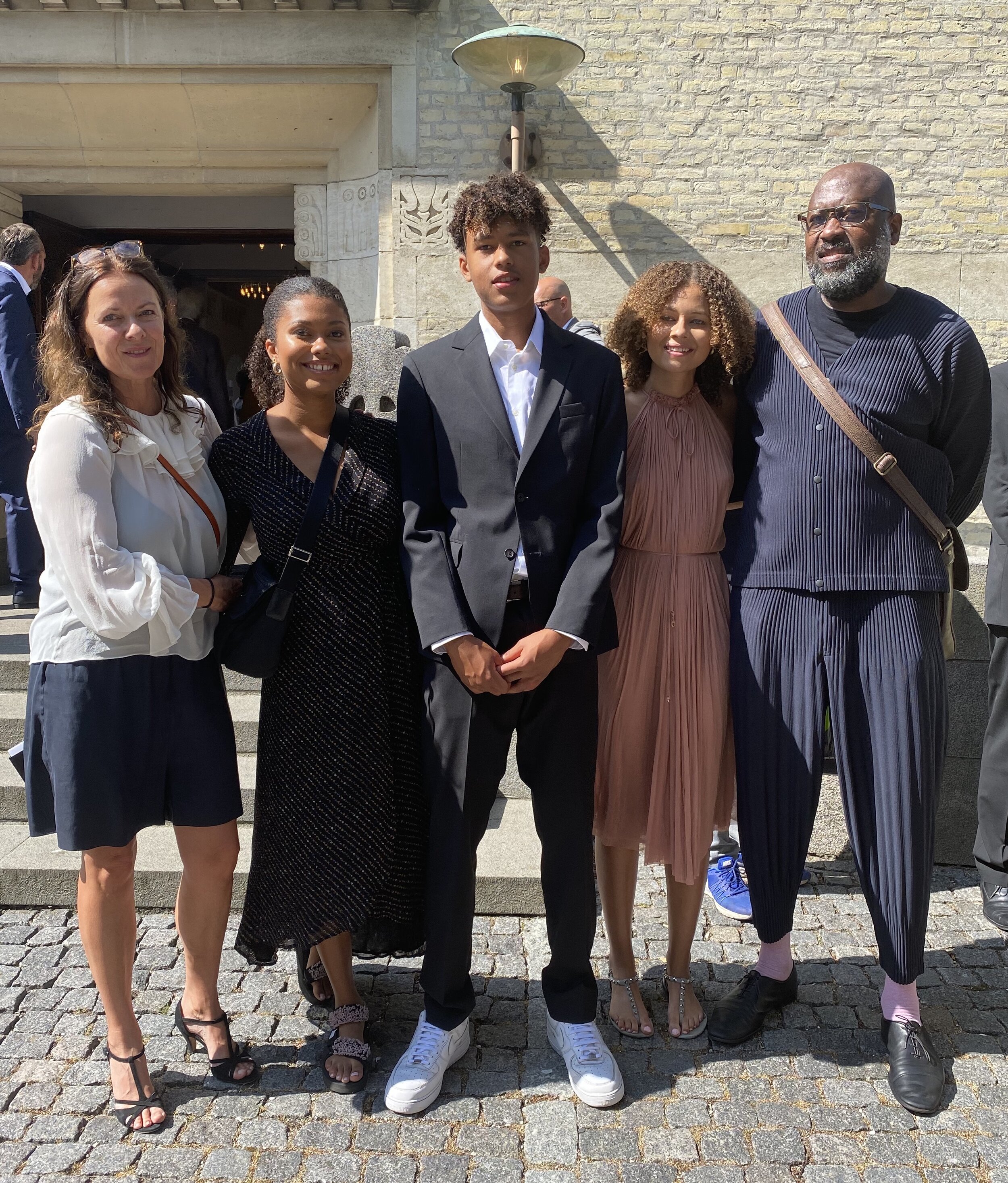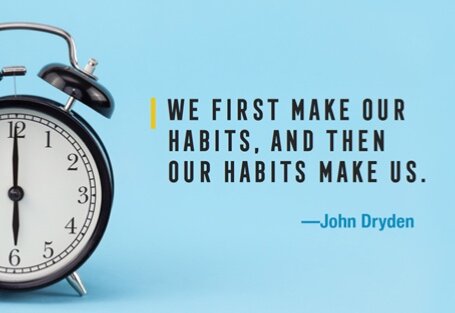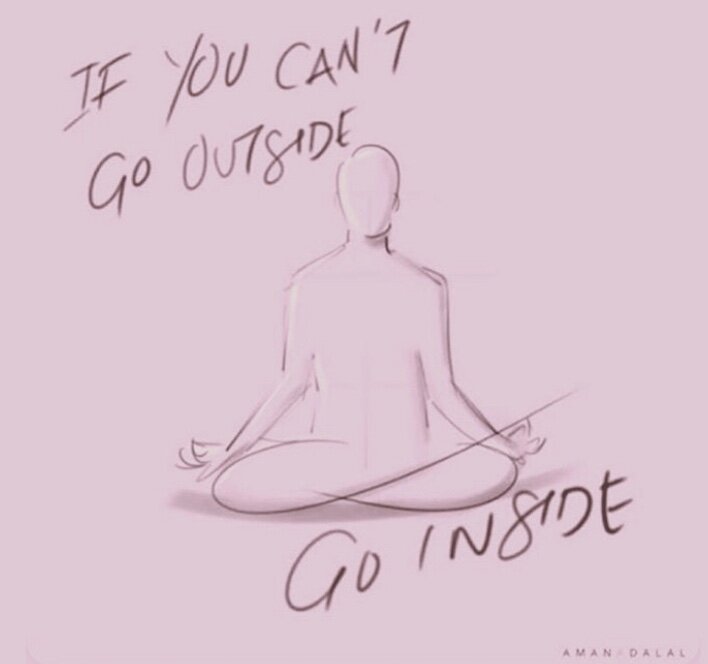How to get our attention?
c/o British Vogue
A vision usually comes from an individual. An entrepreneur. They make their companies and the whole world share the values to which they are attached. Luciano Benetton had a clear image of a world without interracial hatred.
Back in the days the “United Colours of Benetton” campaigns were groundbreaking. AIDS, racism, homosexuality and religion were important issues and Benetton was the brand that provoked the establishment. It’s a real shame that their voice has gone flat.
c/o Wallpaper
I think that when you close your eyes, you see your inner world and when you open them, you see the outside world as it presents itself. If you keep one eye open and the other one closed, your sight is blurred, but you find your vision. Remember that when you look through a telescope, you have to close one eye if you want to see farther!
Hunter vs. Farmer
Traditional salespeople are often compared to hunters, as they stalk their prey (new leads) in the hope of a killing (closing the sale), so that they can return to the tribe with food (revenue). In contrast, farmers plant seeds and nurture crops that will eventually grow over time into food, in other words, farmers prefer to develop long-term relationships and customer loyalty.
Both hunters and farmers have the same objectives and their own set of challenges, I think the farmer has a major advantage over the hunter. While the hunters must go into new territories each day to stalk their prey, farmers stay in one place, planting new seeds and reaping the fruits of their efforts on the same ground they have toiled over already. In return, the land they till becomes infinitely more valuable because it can consistently reap a harvest without going through the hits and misses off hunting.
It’s no different in business, as all salespeople share the same ultimate goal: generating revenue. The big difference is in the tactics they use. Farmers take the time to lay the groundwork for sustained success, they educate themselves on the tactics and techniques of persuading their audience to act by building their own authority in their space. Granted, some hunters also do this too, and the smart ones also think like farmers.
During the current pandemic, I have had the opportunity to look closely at my competencies and roles that I have played throughout my career. I have been both a hunter and farmer, I think that creating contact, trust and credibility are the defining competencies in both roles as increasing revenue and penertrating deeper into the existing client base is fundamental in sales.
Burrellism
“What is written without any sense is read without any sympathy.”
You Know What I Mean
We currently live in an information-rich, time-poor world and as a result, it is easy for us to behave like rats - in other words, we see an opportunity (stimulus) and we jump at it (response). The great thing about being human (aside from our ability to use a TV remote) is that we can exercise choice. So unlike one of B.F. Skinner's rats, our behavioral equation is Stimulus > Choice > Response.
The challenge is that sometimes we move so fast we whoosh right past our choice and feel like we are simply reacting to the multitude of stimuli - demanding customers, boss' deadlines, screaming children, "you've got mail" notifications, web page pop-up ads, Facebook status changes, GPS voices telling us to "veer right", text tones on our phones, etc. So, to help you intentionally respond to inbound opportunities and requests, here are four useful questions:
Does it interest me?
Do I have the resources (skills, money, contacts, knowledge) to make a positive impact?
Do I have the time (our most precious resource) for it?
Can I make the personal commitment necessary to be successful or fulfill the demands?
These questions reveal a thought process that highly successful people use to live intentionally. They never lose sight of the "C" - choice.
The choice is ours. Our success can be accidental or intentional. Choose to live intentionally.
Curiosity Killed The Cat
This week, I have observed the most articulate 2 year old, Isiah is his name. His line of questioning revolved around, “Why? Why is it like this? Which invariably led me to ask the question, “Why can’t it be different?”
I think discovery is seeing what everybody has seen and thinking what nobody has thought.
My process revolves around the 4 D’s (discover, define, develop and define) and therefore, always starts with discovery…
Facts on Friday
This quote from Alfred D’Sousa has always been a favourite of mine: “For a long time it seemed to me that life was about to begin - real life. But there was always some obstacle in the way, something to be gotten through first, some unfinished business, time still to be served, a debt to be paid. At last it dawned on me that these obstacles were my life”.
I think ife and work will always be messy, therefore, trouble shooting, firefighting and problem solving are how we spend a lot of our time so, let’s make sure we enjoy it.
Remember “Happiness is a journey not a destination and complaining is not a strategy.”
Throwback Thursday
Imran Amed, founder and editor-in-chief of The Business of Fashion and I were keynote speakers at Fashion Talks, Antwerp (October 2013).
One Picture is Worth a Thousand Words
What Problems Are You Fixing?
There has never been more tools, technology or creative thinking around how to connect with the consumer. Today, we are building a vast array of habitats inside a single eco-system that is completely connected by software, promotions, technology, data science and we don’t care where the consumer enters, it can be in any of these habitats on the customer journey.
““To get to the head you have to go through the heart.””
In other words, you need to make people feel before they think and act on something. We are storytelling animals and we start developing our understanding of stories through fairytales and role play during our childhood. This continues throughout our lives, as we become professionals, whether you study law, medicine, business or engineering. Regardless of what you are selling, I think that we are all in the business of moving hearts and minds.
Motivation on Monday
If you love someone, tell them now.
If you miss someone, connect with them.
If you appreciate someone, show them.
If you made a mistake, apologise.
If you want to feel lighter, forgive first.
If you are confused, ask more questions.
If you are stuck, ask others for help.
You Do Have A Choice
It’s all about mindset, from the moment you wake up to the moment you rest your head at night, everything is up to you! Your emotions, your thoughts, your perception and your reactions - every moment. When someone tries to trigger you by insulting you or by doing or saying something that irritates you, take a deep breath and switch off your ego. Remember that if you are easily offended, you are easily manipulated!
I think the only thing you can control is how you treat yourself and this knowledge of that one thing can change everything. Before I write anything, be it an e-mail, text message or on SoMe, I ask myself these 3 important questions:
Is it important?
Is it respectful?
Is it necessary?
Service
What are the fundamental capabilities of a human system that are crucial to its capacity to execute flawlessly and innovate consistently?
““We dance round in a ring and suppose,
But the secret sits in the middle and knows.” - Robert Frost”
The words you use to frame your current situation will change your mindset and elevate your mood. A positive mindset allows you to stay open to new possibilities where others see barriers, and a positive mood will lift your spirits and attract people in your life who will help, support or hire you.
Successful individuals in any field used positive words to frame an outcome. It's an imperfect world and despite hours of practice and years of experience, the ball won't always bounce your way. Now and again you will be dealt a bad hand or an unprecedented pandemic, and by default this will change your plans.
I think the important thing is the path you travel and the people who accompany you, not the destination to which it takes you.
Learnings from 2020
Last weekend, my son had his Confirmation (coming of age celebration - an affirmation of faith in God and it is also seen as the transition ritual from a child to adult). During the reception one of his friends asked me a question - What is the biggest lesson you have learned in 2020?
I was quite impressed that a 15-year-old was thinking on such a deep level.
My answer was that I’ve learned that during times of crisis, you can either be a giver or you can be a taker and you choose who you want to be. When this pandemic is over and I look back or you look back, the question we will ask ourselves – “What were you, were you someone who gave and helped during the pandemic or were you someone who took?” So I learned that we have a role to play and you have a choice.
Hellerup Kirke, 15.08.2020
“If” by Rudyard Kipling is one of my favourite poems, do you know it?
If you can dream and not make dreams your master;
If you can think and not make thoughts your aim;
If you can meet with triumph and disaster;
And treat those two impostors just the same,
If you can fill the unforgiving minute
With sixty seconds’ worth of distance run,
Yours is the earth and everything that in it,
And, what is more, you’ll be a man, my son.
What Have I Become?
The COVID-19 pandemic has been a time for reflection. I am fully aware that opportunity is always mixed with difficulty, therefore, the only time when things will change is when I change. “I am not a product of my circumstances I am a product of my decisions.” – Stephen Covey
I had an epiphany last week that made me think about the meaning of my life and what have I become. The voice said, “You can have more than you’ve got because you can become more than you are and unless you change what you are, you’ll always have what you’ve got.” I know that the major key to my better future is me, and in my case true happiness is not contained in what I get, happiness is contained in what I become. I immediately knew that I had to start working on myself and as there are only 24 hours in a day, time was not the issue. You cannot get more time, but you can create more value as we primarily get paid for the value we bring to the marketplace. We have plenty of energy to do the things that we really want to do as motivation creates energy.
The Last Dance - Netflix
What are my life goals? How can you hit a target that I don’t have? How to set goals and how to achieve them? I know that you have to have your goals in place to get what you want, and I have to set the kind of goals that will mean something by achieving them. I have to start by making myself comfortable with being uncomfortable as when you let yourself get comfortable with your way of life, you miss out on what you could accomplish when you keep reaching for the next golden ring. One has to eliminate all the negative influences in your life and that also means friends who are dragging you down and keeping you from reaching your goals.
1. Identify exactly what you want.
2. Why do you want to reach this goal?
3. What are the obstacles you need to overcome in order to achieve this goal?
4. What are the skills and knowledge required to reach this goal?
5. Who are the people, groups, organisations you need to work with in order to achieve this goal?
6. What is the plan of action required to achieve this goal?
7. When is the completion date?
Your goals could be physical, mental, spiritual, social, family, career or financial. Are you committed to reaching your goals? When you have a solid base with a solid commitment and solid objectives then you have a much better chance of reaching your goals. Please do not confuse activity with accomplishment! Have you written out your clearly defined goals? Yes? If no, why not? Is it because of fear, a poor self-image, no desire or just because you don’t know how? Would you like some guidance with how to set your goals? I am interested in building characters and developing leaders. Contact sb@stephenburrell.com
Who is Responsible for Your Return to Work Strategy?
”CUE” illustration by www.ved5tiden.dk
The most successful global leaders in fighting coronavirus have communicated clearly, displayed empathy and always favored science over politics. When challenges arise we don't rise to the occasion, we sink to the level of our training. We have to recognize that things are not going to back to what they were before the coronavirus. The pre-COVID world was all about performance, agility and efficiency, the post-COVID world will be all about one thing - survival. Does your organisation have a plan for how we get people back to work? Are you ready to tackle the challenges ahead?
Health and safety of the workforce should be management’s top priority and managing employee numbers will be critical to protecting workplace health, as the higher the number the higher the risk. Have you thought about the benefits of a staggered reintroduction, e.g. rotating who works from the office and who works at home?
”ROUTINE” illustration by www.ved5tiden.dk
Once open, how can you keep your employees safe? There will be more questions than answers, for example:
- What will be the new physical setup?
- How much distance should there be between desks?
- Have you made restrictions on your office building capacity?
- What about employee gatherings around the coffee machine?
- What about the cafeteria and lunchtime procedures?
- Have you developed new office sanitization protocols?
- Will there be guidelines for wearing personal protective equipment, e.g. face masks and/or gloves?
- What are the rules for checking employees who are returning to work after illness?
- Will your employees need help to manage this mindset change?
- How will you deal with employees who are reluctant to return to the office?
- Do you have a Crisis Management team to deal with ethics and compliance complaints?
Would you like to have a training plan for implementing new operational procedures, processes and policies during your “back to workplace” transition and beyond?
Contact us on sb@peakbalance.dk to hear more on how we can help your organisation.
“REWARD” illustration by www.ved5tiden.dk
Why Do We Do What We Do?
The great Zig Ziglar said, “Motivation gets you going, and habit gets you there. Make motivation a habit and you will get there more quickly and have more fun on the trip. You are free to choose, but the choices you make today will determine what you have, be and do in the tomorrow of your life.”
We are not in the business of knowledge transformation we are in the business of skill acquisition. Do you know the difference between a skill and a habit? A skill is the ability to do something well and a habit is something you do mentally or physically, that starts as a choice and then becomes a nearly automatic pattern.
In reality, a habit is the function of our subconscious mind. There is no greater evidence of the marvelous power of our subconscious than the force and sway habit holds in our life. We form habits in our subconscious mind by repeating a thought or behavior and act it out over and over again until it establishes tracks in our subconscious mind and becomes automatic. What percentage of our daily behaviors are choice? Studies have shown that between 40 and 45% of what we do each day are habits. Therefore, when we understand how habits work, then rather than being the consumer of our lives, we become the creator.
The Power of Habits training is about teaching leaders and individuals how to leverage habits so that they can improve results. The key to exercising regularly, losing weight, being more productive and achieving success is understanding how habits work. The Power of Habits training will do 3 things: increase performance, improve outcome and ignite culture. Performance is what we do, results is what comes from our actions, and culture is how we behave.
We change the world by changing behavior and there’s a process to that and at Peak Balance (Vital Smarts), our digital learning tools can help facilitate training outside the traditional classroom settings. We have put together a series of micro-trainings which consist of a series of short, focused learning modules that are delivered through Adobe Connect. These trainings have proved to be highly effective at accelerating onboarding and improving retention.
For further information - contact: sb@peakbalance.dk
Lonely, Frustrated or Bored
Image: Aman Dalal
Yesterday morning, I was speaking to my elderly parents in London about whether they had changed their eating habits during the pandemic. Jared Diamond in his book, “Guns, Germs, and Steel”, studied why some cultures today are highly advanced and others are still living very primitive. One of the key factors was the difference between how they ate. Today, I reached out to the health expert and nutritional therapist, Thorbjörg Hafsteinsdottir for her opinion. Thorbjörg is the best selling author of “10 Years Younger in 10 Weeks” - As I wanted to know if Thorbjörg agreed with Jared Diamond prognosis?
We know that what we eat has a great impact on our health and how old we get. The “Blue Zones” are areas across the globe where people tend to live the longest and have remarkably low rates of heart disease, cancer, diabetes and obesity. Research has shown that these cultures are different from each other and the diet is not the same, for example, in Okinawa (Japan) their diet consists of fish, plants, sea plants, bitter melon and meat, once or twice a month. In Sardinia (Italy) their diet consists of high protein pasta, olive oil, fish, meat and red wine, and the Hunza’s in north Pakistan eat beans, whole grain bread, some meat and vegetables. Although food choices vary from region to region, what they all have in common are that Blue Zone diets are primarily homemade from scratch, with no added sugar or bad hydrogenated oils and they all steer clear of processed foods. Communal eating with friends and family, high levels of physical activity, low-stress levels and a strong sense of purpose also plays a huge role in their long lives.
Today, it is common knowledge that excessive sugar intake is extremely dangerous! Added sugar in starchy food, bread, cakes, pasta and other high glycemic food, interferes with the blood sugar balance and can make you insulin resistant, leading to obesity and inflammation, which is a part of almost all health problems and known medical diagnoses.
In my opinion, everyone wants to be happy, healthy, wealthy and to have good personal and professional relationships. How would you define who you are and what you do?
Well, I am one of those in your vision group 😊. For the past 30 years or so, I have been teaching, inspiring and motivating people to take action on their health by taking better and healthier choices. I am doing my best to walk the talk.
Currently, we are experiencing the COVID-19 pandemic and we are changing our behaviours and adopting new routines as the global lockdown continues. Everyone is speaking about a vaccine as the solution but I cannot help but think there must be an alternative and as the immune system is the operating system of the body. What role do you think strengthening our immune system could play?
Based on science there is no doubt that having a strong immune system is a good first defence against any germ, bacteria or virus. The elderly and people with pre-existing health conditions (e.g. cardiovascular diseases, diabetes, high blood pressure, chronic respiratory diseases, etc.) are, particularly at risk. There is so much we don't know about the coronavirus and how it behaves in the body. We know it attacks the lungs, and also that it is the immune system that fights this cytokine inflammation storm on the lungs. Due to the genetic range, it is quite normal that some people die from a viral disease while others do not even notice it. The bottom line is that there is no magic pill or a specific food guaranteed to bolster your immune system. I would recommend that you maintain a healthy diet, increase your daily vitamin D intake, improve your sleeping habits, reduce your stress levels and avoid excessive alcohol consumption.
The coronavirus has had unprecedented impacts on the world and some say the worst is yet to come. I have hope for the future and understand that during these uncertain times, it’s more critical than ever to take command of your emotions and attitude. Can you tell me a little about your upcoming online course (in Danish) which starts on Monday 20th April?
The immune system is vital and crucial for our life, all systems in the body are connected to the immune system. On this course, I will take you through the many functions of the immune system - I will speak about blood sugar and insulin, inflammation and obesity, stress, stress factors and sleep. I will also talk about food and diet, advise on what to eat in order to maintain a balanced immune system, sharing plenty of good advice for everything!
This course will provide you with a basic platform - a forum for people to meet, be inspired, gain motivational tools and guidance during these strange times. The loneliness, the frustration of not knowing when this will pass or feeling bored can easily be used as an excuse to lose control and eat your way out of the "crisis". I am here to help prevent that happening, to support you and to support your body and mind.
Thank you Thörbjorg 🙏🏽. I also know that good habits automatically transform our lives therefore I have signed up for your online course.
You can contact Thorbjörg via E: thorbjorg@thorbjorg.dk or T: (+45) 40 91 64 13
Stimulus > Choice > Response
“Between stimulus and response there is a space. In that space is our power to choose our response. In our response lies our growth and our freedom.” – Victor Frankl
We live in an information-rich, time-poor world, as a result, it is easy for us to behave like rats. In other words, we see an opportunity (stimulus) and we jump at it (response). The great thing about being human (aside from our ability to use a TV remote) is that we can exercise choice. So unlike one of *B.F. Skinner's rats, our behavioural equation is Stimulus > Choice > Response.
*B.F. skinner was an American psychologist who developed the Theory of Operant Conditioning. The idea that behaviour is determined by its consequences, be they reinforcements or punishments, which make it more or less likely that the behavior will occur again.
The challenge is that sometimes we move so fast we whoosh right past our choice and feel like we are simply reacting to the multitude of stimuli - demanding customers, boss' deadlines, screaming kids, requests to volunteer, web page pop-up ads, Facebook status changes, "you've got mail" notifications, GPS voices telling us to "veer right", text tones on our telephones, and on and on.
So, to help you intentionally respond to inbound opportunities and requests, here are four useful questions:
Does it interest me?
Do I have the resources (skills, money, contacts, knowledge) to make a positive impact?
Do I have the time (our most precious resource) for it?
Can I make the personal commitment necessary to be successful or fulfill the demands?
These questions reveal a thought process that highly successful people use to live intentionally. They never lose sight of the "C" - choice.
The choice is ours. Our success can be accidental or intentional. Choose to live intentionally.
Contact me here to book a 1:1 session
Crucial Conversations Training
Did you know that I am a certified Crucial Conversations Trainer?
Crucial Conversations teaches skills for creating alignment and agreement by fostering open dialogue around high-stakes, emotional and risky topics - at all levels of your organization. By learning how to speak and be heard (and encouraging others to do the same), you’ll surface the best ideas, make the highest-quality decisions and then act on your decisions with unity and commitment.
What Is a Crucial Conversation?
A crucial conversation is a discussion between two or more people where the stakes are high, opinions vary, and emotions run strong. These conversations - when handled poorly or ignored - lead to strained relationships and dismal results.
What Does Crucial Conversations Training Teach?
Crucial Conversations teaches participants how to:
• Speak persuasively, not abrasively
• Foster teamwork and better decision making
• Build acceptance rather than resistance
• Resolve individual and group disagreements
Who Needs Crucial Conversations Training?
Does your organization suffer from taboo topics, deference, disagreement, analysis paralysis, information hoarding, office politics or alienation? Is your organization battling declining productivity, safety violations, low morale, reduced quality, poor customer satisfaction or other bottom-line concerns? Then you, your team, or your organization needs Crucial Conversations Training.
My aim is to guide teams, leaders and entrepreneurs on how to focus on your company’s performance and culture by integrating open communication into the heart of your business. Crucial Conversations workshops are two days and ideally have a minimum of six participant. For further information please contact me.





